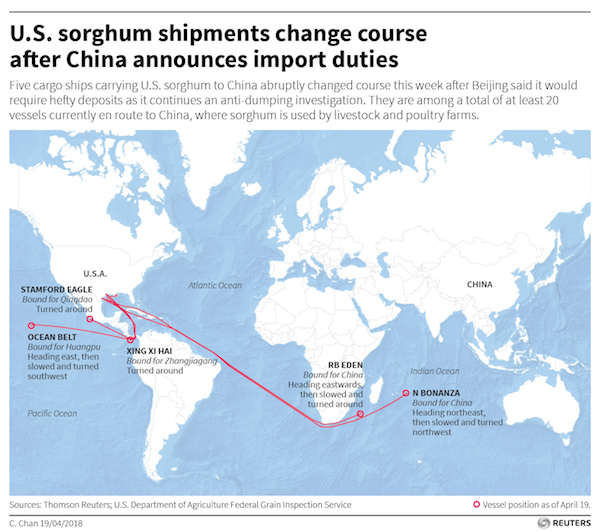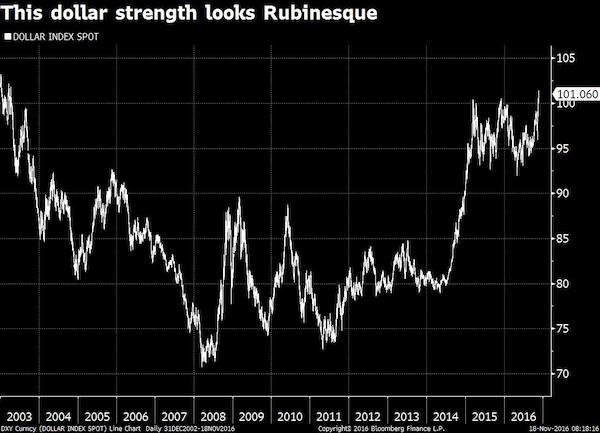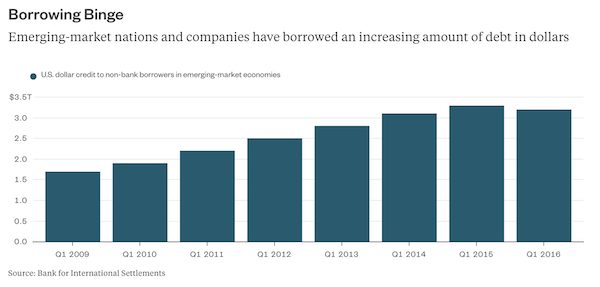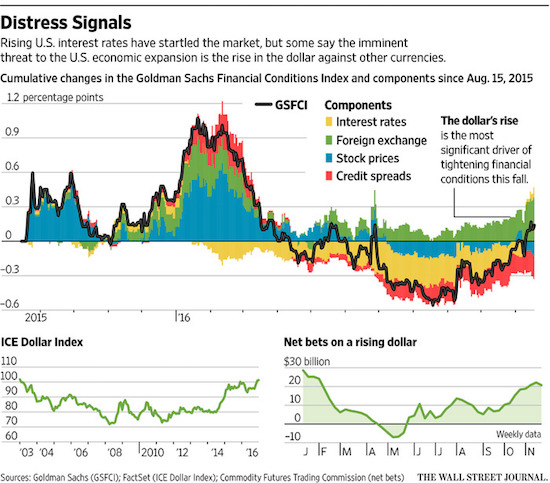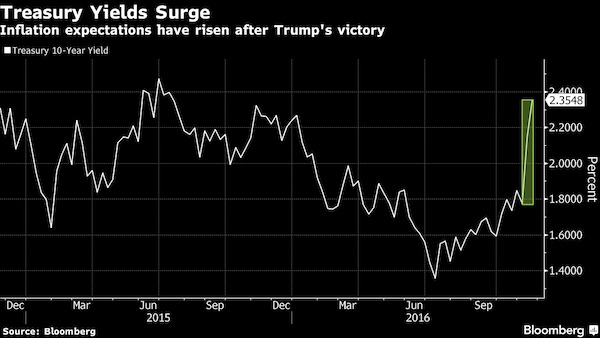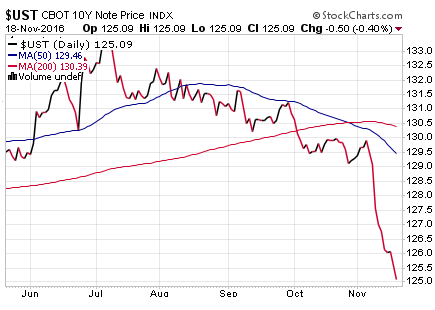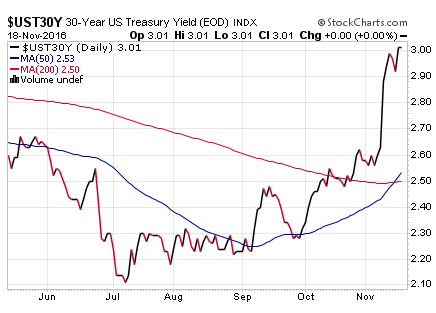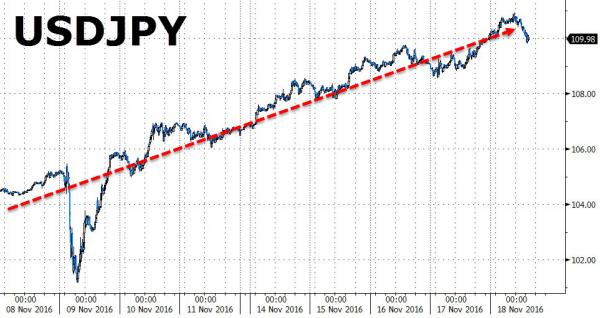
Wassily Kandinsky Moscow Red Square 1916

Perhaps not a good time to chase yield?
• Riskiest Junk Bonds Still Blissful in La-La Land, High-Grade Bonds Bleed (WS)
High-grade corporate bonds have had a hard time. Yields have surged as prices have fallen. The S&P bond index for AA-rated corporate bonds is down 3.2% so far this year. Losses are concentrated on bonds with maturities of 15 years and over. They’re down 7%, according to Bloomberg. As prices have declined, yields have surged, with the average AA yield now at 3.47%, up from around 2.2% in mid to late-2016:
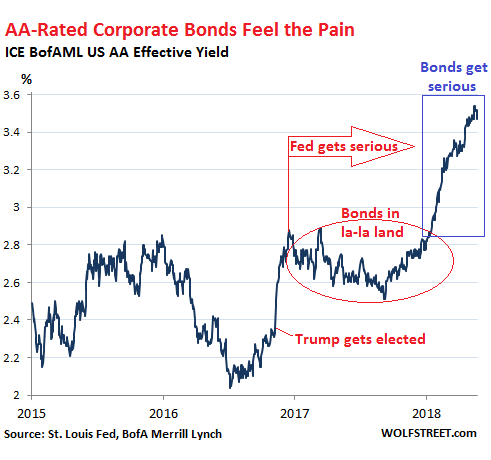
In the chart above of the ICE BofAML US AA Effective Yield Index, I marked some key events, in terms of the bond yield:
• The election in November 2016, after which the yield spiked.
• In December 2016, the Fed’s second rate hike in this cycle. This was when the Fed got serious and added an increasingly more hawkish – or less dovish – tone. But the market blew it off, yield fell again, and bonds returned to la-la-land.
• In September 2017, the Fed announced details of its QE unwind, and yields began to rise again and then started spiking in late-2017. This was when the bond market got serious.But at the riskiest end of the spectrum, with corporate bonds rated CCC or below (deep into junk), there is no such pain. In fact, the S&P bond index for CCC rated bonds is up 4.3% so far this year. They’ve had a blistering 82%-run since February 2016, when Wall Street decided that the oil bust was over and plowed new money into junk-rated energy companies. The average yield of bonds rated CCC or lower is now at 9.78%, down from 12.5% in December 2016, when the Fed got serious, and down from 22% during the peak of the oil bust:
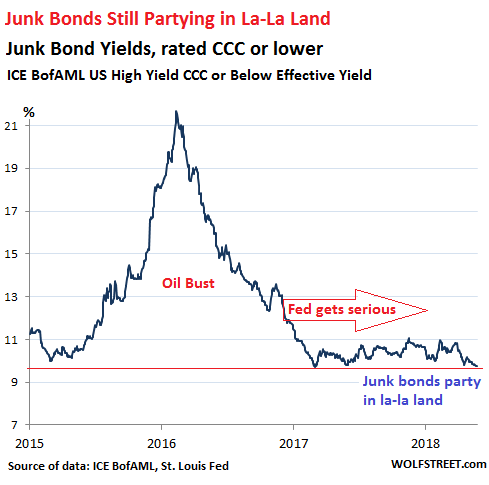

Looking for the third victim.
• When Rates Go Up, Stuff Blows Up (Dillian)
When rates go up sharply, stuff blows up, because lots of people are negatively exposed to higher rates. Households, corporates, and governments are all negatively exposed to higher rates, in different degrees. Back in 1994, we found that it was Mexico, Procter & Gamble, and Orange County, California who all suffered because of higher interest rates. Where does the risk live today? We will soon find out. There is a playbook for when interest rates go up. Rising interest rates do not necessarily cause a recession per se, but they are usually found at the scene of the crime. There was no recession in 1994, but the financial world shivered. Today, we have rising rates and a more-hawkish Fed which has shown no signs of letting up.
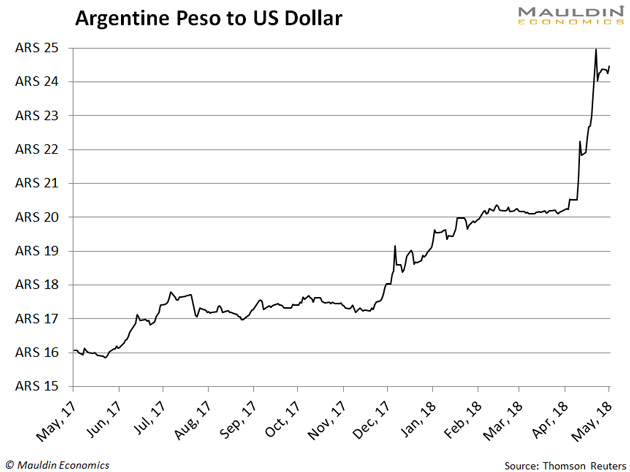
As usual, emerging markets are puking their guts out. I was in Argentina last week and saw the carnage first-hand. The Argentine peso declined a smooth 20% in a week. Meanwhile, Turkish President Recep Erdogan is calling himself an “enemy of interest rates.” He is an FX trader’s dream. Of course, there are idiosyncratic things going on in Argentina and Turkey, but all EM currencies and stock markets have been getting hit hard. Emerging markets was a consensus pick at the beginning of 2018, so it is making some people look a bit foolish.
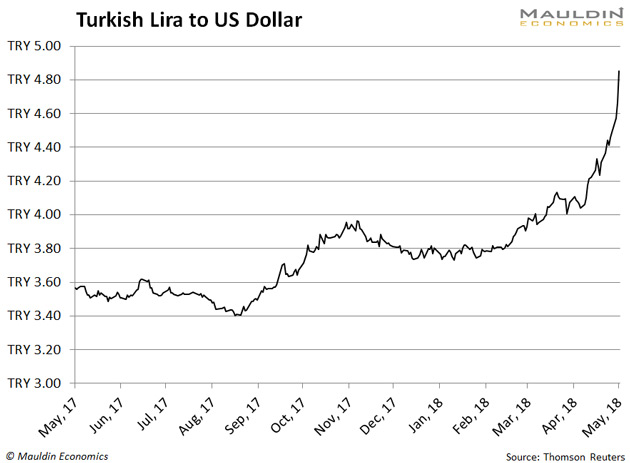

“..the ratio of non-housing consumer debt to disposable income – the burden these consumers carry on the backs in relationship to their incomes – is higher than ever..”
• Where America’s Debt Slaves Are the Most Vulnerable (WS)
Many consumers are debt free and have lots of money and good jobs. Other consumers have large amounts of debt, lousy jobs or no jobs, and are paying for groceries by charging them on their credit cards. Credit problems always involve the most vulnerable consumers. During the mortgage crisis, the delinquency rate peaked at 11.5% in 2010. It wasn’t the 60% of homeowners that had significantly payed down their mortgages or owed no money on their homes who triggered that event. It was the financial mayhem among the smaller portion of the most exposed and most vulnerable. For a different view of the burden of debt, let’s look at non-housing consumer debt, because this is where the music is playing right now.
To eliminate for a moment the impact of interest rates, let’s look at the amount of debt – not the monthly payments – as percent of disposable income. And suddenly, the risks emerge a little more clearly. At year-end 2017, the ratio of non-housing debt – revolving credit such as credit card balances, plus auto loans and student loans – to disposable income reached a new record of 26.3%, up from 23% at the end of 2010, and up from 24% in 2007, the peak before it all came apart during the Great Recession:
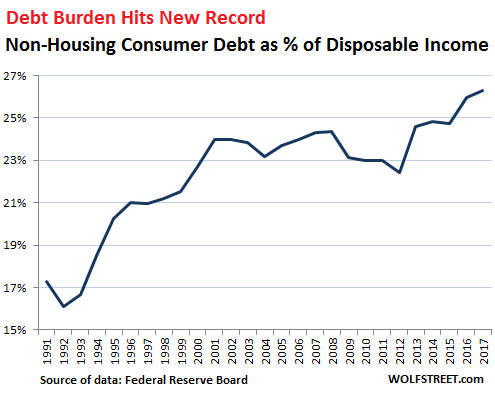
So the ratio of non-housing consumer debt to disposable income – the burden these consumers carry on the backs in relationship to their incomes – is higher than ever, and only historically low interest rates have kept it manageable. But interest rates are now rising, and many of these consumer debts have variable rates. This explains a phenomenon that is already appearing: How this toxic mix – rising interest rates and record high consumer debt in relationship to disposable income – has now started to bite the most vulnerable consumers once again. And for them, debt service is getting very difficult. In Q1, the delinquency rate on credit card debt at banks other than the largest 100 – so at the 4,788 smaller banks – spiked to 5.9%, higher than at the peak during the Financial Crisis, and the credit-card charge-off rate spiked to 8%.

They seem more than open.
• North Korea Says Still Open To Talks After Trump Cancels Summit (R.)
North Korea responded on Friday with measured tones to U.S. President Donald Trump’s decision to call off a historic summit with leader Kim Jong Un scheduled for next month, saying Pyongyang hoped for a “Trump formula” to resolve the standoff over its nuclear weapons program. On Thursday, Trump wrote a letter to Kim to announce his withdrawal from what would have been the first-ever meeting between a serving U.S. president and a North Korean leader in Singapore on June 12. “Sadly, based on the tremendous anger and open hostility displayed in your most recent statement, I feel it would be inappropriate, at this time, to have this long-planned meeting,” Trump wrote.
Trump’s announcement came after repeated threats by North Korea to pull out of the summit over what it saw as confrontational remarks by U.S. officials. Friday’s response by North Korean Vice Foreign Minister Kim Kye Gwan was more conciliatory, specifically praising Trump’s efforts. “We have inwardly highly appreciated President Trump for having made the bold decision, which any other U.S. presidents dared not, and made efforts for such a crucial event as the summit,” Kim said in a statement carried by state media. “We even inwardly hoped that what is called “Trump formula” would help clear both sides of their worries and comply with the requirements of our side and would be a wise way of substantial effect for settling the issue,” he said, without elaborating.

Caitlin: “..Pence blathered something about it being “a fact”, not a threat, but that is because he is a fake plastic doll manufactured by Raytheon. ..”
• Brilliant Strategy Of Offering North Korea “The Libya Model” Falls Through (CJ)
Three days before President Trump announced him as the new National Security Advisor, deranged mutant death walrus John Bolton appeared on Radio Free Asia and said of negotiations with North Korea, “I think we should insist that if this meeting is going to take place, it will be similar to discussions we had with Libya 13 or 14 years ago.” Bolton has been loudly and publicly advocating “the Libya model” with the DPRK ever since. “I think we’re looking at the Libya model of 2003, 2004,” Bolton said on Face the Nation last month, and said the same on Fox News Sunday in case anyone failed to get the message.
Bolton never bothered to refine his message by saying, for example, “Without the part where we betray and invade them and get their leader mutilated to death in the streets.” He just said they’re doing Libya again. This was what John Bolton was saying before he was hired, and this was what John Bolton continued to say after he was hired. This was what John Bolton was hired to do. He was hired to sabotage peace and facilitate death and destruction. That is what he does. That is what he is for. Can openers open cans, John Bolton starts wars. You don’t buy a can opener to rotate your tires, and you don’t hire John Bolton to facilitate peace. It should have surprised no one, then, when the administration saw Bolton’s Libya comments and raised him a canceled peace talk.
“You know, there were some talk about the Libya model last week,” Vice President Pence told Fox News on Saturday. “And you know, as the president made clear, you know, this will only end like the Libya model ended if Kim Jong-un doesn’t make a deal.” “Some people saw that as a threat,” Fox’s Martha MacCallum replied, because there is no other way it could possibly be interpreted. Pence blathered something about it being “a fact”, not a threat, but that is because he is a fake plastic doll manufactured by Raytheon.

The comments here on GDPR are at least as interesting.
• About $1.2 Billion In Cryptocurrency Stolen Since 2017 (R.)
Criminals have stolen about $1.2 billion in cryptocurrencies since the beginning of 2017, as bitcoin’s popularity and the emergence of more than 1,500 digital tokens have put the spotlight on the unregulated sector, according to estimates from the Anti-Phishing Working Group released on Thursday. The estimates were part of the non-profit group’s research on cryptocurrency and include reported and unreported theft. “One problem that we’re seeing in addition to the criminal activity like drug trafficking and money laundering using cryptocurrencies is the theft of these tokens by bad guys,” Dave Jevans, chief executive officer of cryptocurrency security firm CipherTrace, told Reuters in an interview. Jevans is also chairman of APWG.
Of the $1.2 billion, Jevans estimates that only about 20 percent or less has been recovered, noting that global law enforcement agencies have their hands full tracking down these criminals. Their investigations of criminal activity will likely take a step back with the European Union’s new General Data Protection Regulation, which takes effect on Friday. “GDPR will negatively impact the overall security of the internet and will also inadvertently aid cybercriminals,” said Jevans. “By restricting access to critical information, the new law will significantly hinder investigations into cybercrime, cryptocurrency theft, phishing, ransomware, malware, fraud and crypto-jacking,” he added.
GDPR, which passed in 2016, aims to simplify and consolidate rules that companies need to follow in order to protect their data and to return control of personal information to EU citizens and residents. The implementation of GDPR means that most European domain data in WHOIS, the internet’s database of record, will no longer be published publicly after May 25. WHOIS contains the names, addresses and email addresses of those who register domain names for websites.
WHOIS data is a fundamental resource for investigators and law enforcement officials who work to prevent thefts, Jevans said. He noted that WHOIS data is crucial in performing investigations that allow for the recovery of stolen funds, identifying the persons involved and providing vital information for law enforcement to arrest and prosecute criminals. “So what we’re going to see is that not only the European market goes dark for all of us; so all the bad guys will flow to Europe because you can actually access the world from Europe and there’s no way you can get the data anymore,” Jevans said.

Facebook makes contradictory claims: First, it says it’s a neutral platform. But then it also wants full freedom to edit.
Interesting court case: the claim is Facebook stiffed 40,000 (!) companies. Reason why? It completely missed the shift to smartphones, and its ads were not ready for that at all.
• Zuckerberg Set Up Fraudulent Scheme To ‘Weaponise’ Data, Court Case Alleges (G.)
Mark Zuckerberg faces allegations that he developed a “malicious and fraudulent scheme” to exploit vast amounts of private data to earn Facebook billions and force rivals out of business. A company suing Facebook in a California court claims the social network’s chief executive “weaponised” the ability to access data from any user’s network of friends – the feature at the heart of the Cambridge Analytica scandal.A legal motion filed last week in the superior court of San Mateo draws upon extensive confidential emails and messages between Facebook senior executives including Mark Zuckerberg. He is named individually in the case and, it is claimed, had personal oversight of the scheme.
Facebook rejects all claims, and has made a motion to have the case dismissed using a free speech defence. It claims the first amendment protects its right to make “editorial decisions” as it sees fit. Zuckerberg and other senior executives have asserted that Facebook is a platform not a publisher, most recently in testimony to Congress. Heather Whitney, a legal scholar who has written about social media companies for the Knight First Amendment Institute at Columbia University, said, in her opinion, this exposed a potential tension for Facebook. “Facebook’s claims in court that it is an editor for first amendment purposes and thus free to censor and alter the content available on its site is in tension with their, especially recent, claims before the public and US Congress to be neutral platforms.”
The company that has filed the case, a former startup called Six4Three, is now trying to stop Facebook from having the case thrown out and has submitted legal arguments that draw on thousands of emails, the details of which are currently redacted. Facebook has until next Tuesday to file a motion requesting that the evidence remains sealed, otherwise the documents will be made public.

Somewhat oddly similar to the article above, also Guardian. Facebook is up against people who actually DO understand the field.
• Facebook Accused Of Conducting Mass Surveillance Through Its Apps (G.)
Facebook used its apps to gather information about users and their friends, including some who had not signed up to the social network, reading their text messages, tracking their locations and accessing photos on their phones, a court case in California alleges. The claims of what would amount to mass surveillance are part of a lawsuit brought against the company by the former startup Six4Three, listed in legal documents filed at the superior court in San Mateo as part of a court case that has been ongoing for more than two years. A Facebook spokesperson said that Six4Three’s “claims have no merit, and we will continue to defend ourselves vigorously”. Facebook did not directly respond to questions about surveillance.
Documents filed in the court last week draw upon extensive confidential emails and messages between Facebook senior executives, which are currently sealed. Facebook has deployed a feature of California law, designed to protect freedom of speech, to argue that the case should be dismissed. Six4Three is opposing that motion. The allegations about surveillance appear in a January filing, the fifth amended complaint made by Six4Three. It alleges that Facebook used a range of methods, some adapted to the different phones that users carried, to collect information it could use for commercial purposes.
“Facebook continued to explore and implement ways to track users’ location, to track and read their texts, to access and record their microphones on their phones, to track and monitor their usage of competitive apps on their phones, and to track and monitor their calls,” one court document says.

All over the place.
• EU Officials Tear Into UK’s ‘Fantasy’ Brexit Negotiating Strategy (Ind.)
Brexit negotiations have begun to dramatically sour after months of deadlock, with exasperated EU officials tearing into Britain’s “fantasy” negotiating strategy and warning that Theresa May’s latest customs plan would ruin any chance of progress. This week’s latest meetings are understood to have produced no progress on the core issues of the Northern Ireland border and customs, with last year’s business-like start to discussions having given way to bitter behind-the-scenes briefings. One senior EU official said the UK still lacked negotiating positions on a wide variety of issues and that in others it was “chasing the fantasy of denying the consequences of Brexit in a given policy area” – while a UK government source accused Brussels of trying to “insult” the British negotiating team.
Another Brussels official close to talks told The Independent they had been warned internally that there would probably be no progress by the June meeting of the European Council – which would throw off the timetable and raise the risk of a disastrous “no deal”. News that Theresa May wants to align the whole UK with the customs union and single market on a time-limited basis until 2023 as a backstop to solve the Irish border issue was particularly poorly received in Brussels. The Prime Minister is due to actually announce the new policy in the comings weeks, but people familiar with the talks confirmed it had already been raised by UK negotiators. The European Commission’s negotiators have already rejected the plan before its public announcement

Then agan, Tsipras folded too…
• Italy’s Belligerent New Coalition Is Bad News For The EU (Marsili)
As Giuseppe Conte is asked to form Italy’s next government, I walk out of a screening of Loro, the controversial portrayal of Silvio Berlusconi by Oscar-winning director Paolo Sorrentino. With images of drug-fuelled sex parties still in my mind, the uproar that accompanies the announcement about Conte appears odd. Italy has endured more than 30 years of dreadful governments. For much of the last two decades the country was led by a convicted tax fraudster. Before that, it was led by Bettino Craxi, a politician so corrupt that he ended his days as a fugitive in Tunisia. Why worry now? Part of the answer lies in the outsider nature of the new governing parties. Italian elites have traditionally been very adept at assimilating political newcomers.
Who, in turn, have been willingly co-opted by the system. But the new coalition of the Five Star Movement and far-right League appears peculiarly unconnected to Italy’s high establishment: the risk of loss of influence is real enough. Previous governments were quick to guarantee policy continuity, maintaining a neoliberal economic stance, overall respect for EU obligations, and a US-aligned foreign policy. The coalition promises to break away from this consensus, ushering in an era of fiscal expansion, resentment at Italy’s eurozone membership and closer ties to Russia. The key question now is: will the new government abandon its fiery stance or stick to it? Both alternatives are unfortunately dreadful.
The capitulation scenario is a familiar one. Just like Alexis Tsipras, who turned into a reliable implementer of austerity measures in Greece, so Conte’s government might decide to set aside its promises. The gulf is wide: the coalition programme contains at least €60bn of additional yearly expenses, or 3.5% of Italy’s GDP, while the EU is demanding a 0.6% deficit reduction for 2018. A bargain might look strikingly similar to what Matteo Renzi has achieved in recent years: a moderate loosening of deficit targets allowing for an insignificant fiscal expansion. In other words: business as usual.

Cuts, cuts, cuts, taxes and sell-offs.
• Greece’s Post-Bailout Program Contains At Least 20 Milestones For 2018-2022 (K.)
The sweeping agreement for the conclusion of the fourth bailout review, publicized early on Thursday by the European Commission, contains binding commitments for Greece until 2022. It more or less constitutes an extension to the bailout agreement for another four years, but without the inflow of money, while rendering the coalition government’s rhetoric regarding a “clean exit” and its so-called “holistic plan for growth” irrelevant. The text uploaded by the Commission on its website leaves open the possibility for the income tax discount reduction to be brought forward by 12 months to January 2019, and provides for the monitoring of the deal’s implementation in the context of the enhanced surveillance to be agreed in the next Eurogroup meeting on June 21.
Besides the almost 90 milestones that need to be implemented in the next three weeks for the completion of the program, the government is undertaking at least 20 post-program obligations to be applied by 2022. The post-program milestones start from the fiscal side: Apart from the well-known primary budget surplus of 3.5% of GDP, the adjusted bailout agreement calls for additional interventions should any court decisions annul any austerity measures in place.
The text also contains the reduction of pensions from 2019 to save 1% of GDP, the full abolition of the EKAS benefit for people on low pensions, the completion of the National Cadaster by June 2021, the implementation of privatizations such as the gas network operator (DESFA), the 17% stake in PPC, and the Elliniko development, among others, and ceilings on civil servant employment and salaries by 2022. The document further refers to the need to improve labor mediation to avert recourse to arbitration, the completion of the process for hiring general and special secretaries for ministries, and the immediate transfer of railway property company GAIAOSE and the company managing the Olympic Sports Center of Athens to the privatizations hyperfund.

Don’t let accountants run your health care.
• How Rural America Became A Hospital Desert (G.)
It makes sense to sell this old place now, but he can’t bring himself to leave her ashes. Barry Gibbs lives alone in a single-story home among the loblollies of Hyde County in eastern North Carolina. The army veteran collects a small disability check after he tore tendons in his shoulder during a fall at his maintenance job at the local school. He winces every time he stands up. He’s 64 years old and the closest hospital is more than an hour away, a distance he came to understand too damn well on the day she needed help. Their wedding portrait still hangs on the living room wall. It’s one of those 1980s shots with the laser beam backgrounds, her hair big and his mustache combed, his hand on her shoulder.
The interior of the house is almost as she left it four years ago: white oak floors, paintings of black bears, family Christmas photos on end tables. Outside along the driveway, a line of cypress trees shades a headstone that marks where Barry cut a ditch and spread Portia’s ashes, right where she asked to be. Everybody called her Po. She was picking up sticks from the yard on 7 July 2014, five days shy of her 49th birthday, when she felt a sharp pain in her chest. Six days earlier, their community hospital had closed. Pungo district hospital was 47 miles west of their house, in Belhaven, and had served the county since 1949, back when crab-picking plants and lumber mills kept these small waterfront communities working.
If you’re an accountant, hospitals are only as good as the number of paying patients. Belhaven’s population is about half what it was then. And Hyde county is now the fifth-sparsest county on the east coast, with nine people per square mile. This spongy stretch of North Carolina’s inner banks represents the suffering side of a modern migration pattern in which southern cities are flourishing, but rural areas are shrinking and losing healthcare options. Since 2010, 53 rural hospitals have closed in 11 southern states, compared with 30 in the other 39 states.



